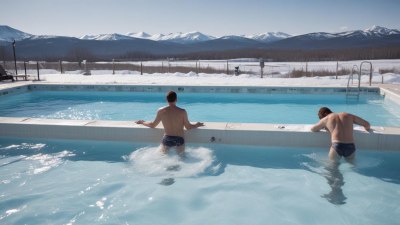Why No One Warns You About the Arctic Chill of Getting Out of a Pool
Discover the hidden truth about the chilling experience of leaving the pool and its effects on your body.

This image was created with the assistance of Freepik
When the summer sun is blazing and the heat is nearly unbearable, there’s nothing quite as refreshing as a dip in the pool. The cool water envelops you, providing instant relief from the sweltering temperatures. However, as you take that final plunge and prepare to exit, an unexpected phenomenon occurs: the Arctic chill of getting out of the pool. This chilling transition often catches swimmers off guard, leaving many to wonder why no one warned them about it.
The sensation of coldness when emerging from warm water is largely attributed to a combination of factors, including water temperature, air temperature, humidity, and your body's natural response to sudden changes in environment. Though some may find it invigorating, others may shiver uncomfortably as their body's thermostat works to re-regulate itself. In this article, we'll explore the physiological reasons behind the chill, the environmental influences, and the myths and realities surrounding this common experience.
The Science Behind the Chill
To understand how the Arctic chill occurs, it’s essential to consider the laws of thermodynamics. When you immerse yourself in a pool, your body reaches thermal equilibrium with the water. If the water is cool, your body might lose heat slightly, but it still feels refreshing because your body radiates heat to the surrounding air. However, when you exit the pool, the cool water clinging to your skin begins to evaporate, and this is where the chill kicks in. The evaporation process requires energy, and it takes that energy in the form of heat from your body, leading to a drop in your skin temperature.
Another crucial factor is the air temperature. When the air temperature is significantly lower than the water temperature, the contrast becomes even more pronounced. For instance, stepping out of a heated pool into ambient air at around 65°F (18°C) can induce a noticeable chill, compared to exiting into warmer air. Even on hot summer days, the humidity can exacerbate the cooling effect as sweat evaporates quickly, leaving you feeling even cooler.
Body's Response to Temperature Changes
Your body is constantly working to maintain a stable internal temperature, a process known as thermoregulation. When you exit the water, your body responds by constricting blood vessels in the skin to conserve heat. Initially, you may feel a rush of cold as your body aches to retain warmth. This physiological response can lead to shivering if the contrast between water and air is too great. Shivering is your body's way of generating heat through muscle contractions, ultimately trying to return you to a comfortable state.
Moreover, the sensation of coldness can be heightened if you have sensitive skin or if you have been swimming for an extended period. The longer you spend in the water, the more pronounced the disparity may seem upon exiting. Swimmers often experience heightened awareness of temperature differences due to the prolonged exposure to the cooler water, leading to an even greater shock to the system when they re-enter the outside environment.
Humidity and Its Role in the Chill
Humidity plays a crucial role in how we perceive temperature changes. When humidity levels are high, the moisture in the air reduces the cooling effect of evaporation. Upon leaving the pool, if the air is damp, your skin may not dry quickly, exacerbating the chill as you transition from the warm water to a potentially cooler atmosphere. Conversely, on dry, low-humidity days, the evaporation from your skin can occur rapidly, leading to a more pronounced cooling effect and a heightened sensation of chill.
Interestingly, humidity can also affect your body’s ability to produce sweat, which plays a critical role in cooling. When your body cannot sweat efficiently due to high humidity levels, exiting the water can feel even colder, as your normal cooling mechanisms become less effective. It’s a delicate balance that shapes our perception of cold and can make the experience of leaving a pool more shocking than anticipated.
How to Minimize the Chill
Fortunately, there are several strategies you can employ to mitigate the cold when exiting the pool. First and foremost, consider the temperature of the water. If you have control over pool settings, keeping the water at a comfortable temperature can ease the transition. A pool heated to a comfortable temperature can reduce the shock of moving into cooler air.
Wearing a cover-up, light robe, or towel as you exit the pool can help trap warmth close to your skin, thereby minimizing the effects of the chill. This barrier acts as an insulator, providing your body with extra warmth while allowing you to gradually acclimate to the cooler air. Additionally, you may want to bring a warm drink to sip on while you're drying off. A warm beverage can help raise your internal body temperature and lessen the feeling of chill.
Debunking Myths About Pool Temperature
Many myths circulate around pool temperature and how it affects your enjoyment of swimming. Some people believe that if a pool is heated, it will decrease the incidence of the post-swim chill; however, it is essential to note that the air temperature is equally pivotal. A heated pool may feel luxurious while swimming, but emerging into a cold breeze can negate the benefits, leading to an unwelcome experience. Conversely, swimming in cooler water on a hot day can be refreshing, yet failing to prepare for the temperature drop upon exit may cause shivering and discomfort.
Another common myth is that those who are acclimatized to swimming year-round will not experience this chill as drastically. While frequent swimmers may adapt better to cooler water temperatures, they still undergo the same physiological processes when exiting the water – the chill is inevitable under certain conditions.
Psychological Perception of Cold
Aside from physiological factors, psychological aspects influence how we experience the sensation of cold when emerging from water. Anticipation can play a major role; if you expect to feel cold and brace for it, your perception of the chill may be heightened. Conversely, enjoying the moment and allowing yourself to be present without fear of the cool air can lessen the shock of stepping out of the water.
Moreover, peer influence can sometimes amplify the experience. If everyone around is shivering and expressing discomfort at the chill, you may find yourself more acutely attuned to your own feelings of coldness. On the other hand, if your peers exude a relaxed attitude towards the air temperature, you may find it easier to accept the chill as simply part of the swimming experience.
The Importance of Awareness
As we’ve seen, the Arctic chill of exiting a pool is a complex interplay of physical, environmental, and psychological factors. Awareness of this phenomenon can lead to better preparation and strategies to handle it. Whether you choose to bring a towel, a warm drink, or strategically select the time and environmental conditions for your swim, being aware of the potential for chill can enhance your overall experience.
Ultimately, while the surprise of the chill can be jarring, making adjustments can ensure swimming remains a pleasurable experience. Embracing the sudden weather change as part of the joy of swimming can lead you to fully enjoy your time in the pool, without focusing too intensely on the moments of discomfort afterward. With the right strategies, you’ll be better equipped for the journey from poolside to dry land.
The Joy of Swimming Beyond the Chill
It’s crucial to remember that despite the chill experienced when leaving the pool, the benefits of swimming far outweigh the discomfort of a brief cold spell. Swimming is a wonderful full-body exercise that improves cardiovascular health, strengthens muscles, and enhances flexibility. It is not just a refreshing retreat from sweltering heat but also a therapeutic activity that reduces stress and promotes mental well-being.
So, the next time you enjoy a swim, remind yourself that the chill you feel when exiting the water is a natural part of the experience. Be prepared, manage your expectations, and don’t let the cold deter you from indulging in the joys of swimming once again. Dive into the experience fully, knowing that every dip is an opportunity to relish the water, even as you navigate the inevitable chill of emergence. By adjusting your approach and mindset, the Arctic chill can become just another part of the wonderful adventure of swimming.











